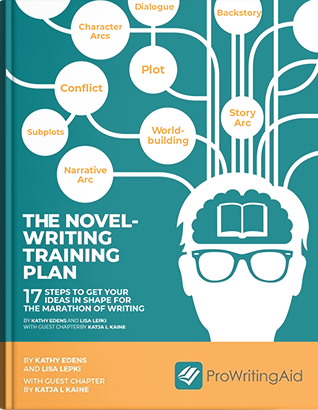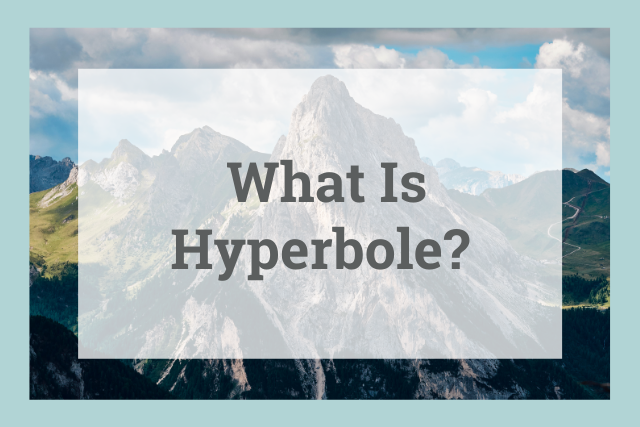
“My feet are killing me!”
“What do you have in this bag? It weighs a ton!”
“I’m drowning in paperwork.”
You’ve probably heard these common expressions before—you may have even thought the speaker was being a bit dramatic. That’s because they were using hyperbole.
What Is Hyperbole?
Hyperbole is extreme exaggeration used to emphasize a point. So instead of saying the bag is heavy in the example above, we say it “weighs a ton” (even though that probably isn’t true).
When you use hyperbole, you turn things up a million notches.
Hyperbole is a rhetorical device, literary device, and a type of figurative language.
Rhetorical devices are techniques and stylistic touches speakers and writers use to evoke a response in their audiences—usually, one that prompts the audience to see the speaker’s point of view.
Literary devices are a sub-category of rhetorical device. While rhetorical devices can be used in any form of speech or writing, literary devices are used only in literature.
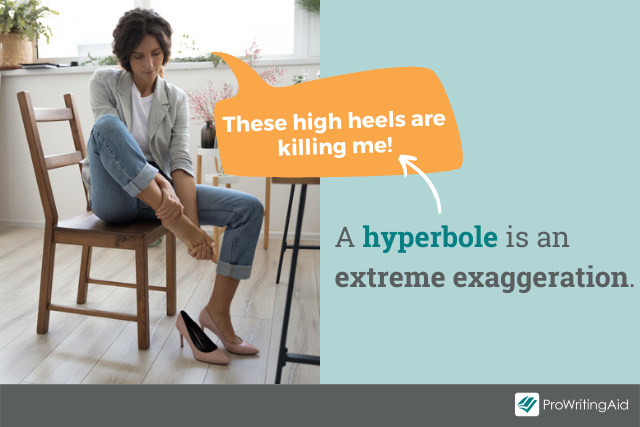
When writers or speakers use figurative language, they use figures of speech, non-literal language, to emphasize an idea or emotion or provide a sensory experience.
As an ultra-exaggeration, hyperbole is certainly not to be taken literally.
We’ve used five examples of hyperbole throughout this article. See if you can spot them. To help you out, they're all in bold.
How Do You Pronounce Hyperbole?
Tip: If you’re not sure how to pronounce the word hyperbole, here’s some help: high-PER-bo-lee
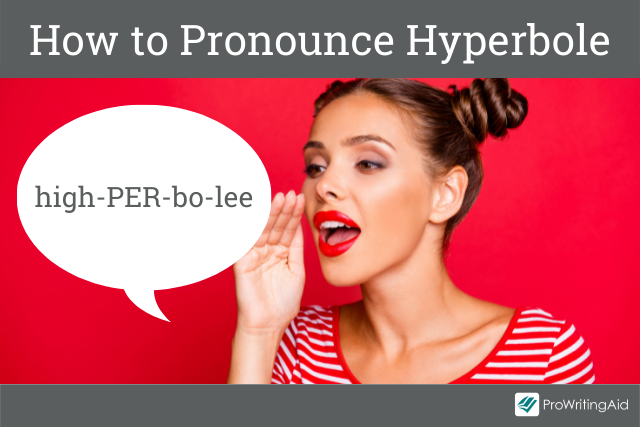
Hyperbole Is Extreme Exaggeration
In using hyperbole, you take an ordinary exaggeration to new heights.
If I’m really hungry, I might say, “I’m so hungry I could eat that entire pizza” even though I really mean I could eat a slice or two beyond my usual consumption.
My “entire pizza” comment is an exaggeration.
But if I say, “I’m so hungry I could eat every pizza in the pizzeria as well as the tables and ovens!” I have taken my exaggeration to the “nth” degree and have used hyperbole.
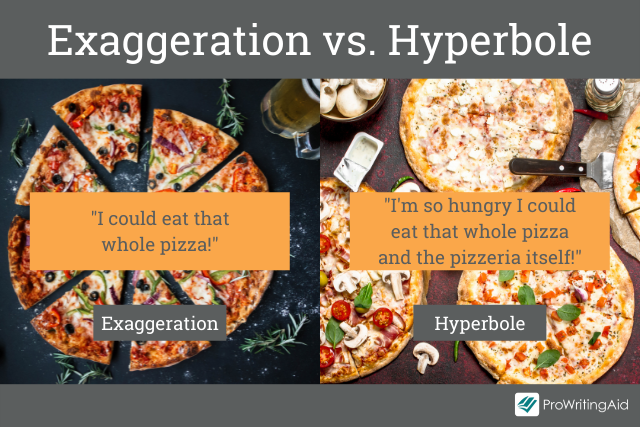
We all know exaggerators: those people who “had the flu” when they really had a cold or “had such a great time” when the party was just okay, or when they say “I was folding laundry for hours today,” when it only took one.
We learn to take what they say (or if we’re the exaggerators, expect others to take what we say) with that figurative grain of salt.
Hyperbole is such an obvious exaggeration that we need not take any grains of salt.
When we speak hyperbolically, we don’t expect people to take our words literally. At least that’s the way it’s supposed to work, but more on that later.
Why Use Hyperbole?
Hyperbole is a way to accentuate a point—with gusto. Sometimes that gusto is intended to be humorous, other times it’s used to rally support or execute sharp criticism or deep discontent.
Whatever the context, remember that the intent of hyperbole is to add unmistakable emphasis.
Hyperbole is figurative language because it is used intentionally. The speaker knows that the hyperbole is an exaggeration and knows the receiver will receive it as such: that’s the point.
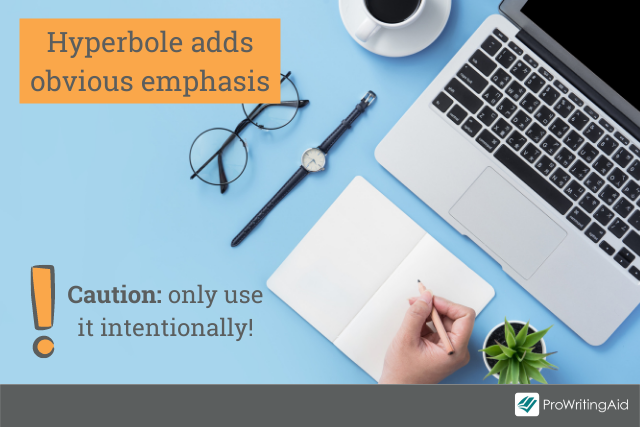
Using Hyperbole in Everyday Speech
We use hyperbole often in our everyday speech. You’ve probably said or heard versions of many of these examples:
- I’m so confused my head is spinning.
- I have mountains of paperwork to finish!
- I haven’t eaten since lunch. I’m about to die of hunger.
- I’ve told you a million times!
- That care cost her an arm and a leg.
- You have enough food to feed an army!
That list is just a start. I could fill a library with all of the hyperboles we use in everyday conversation!
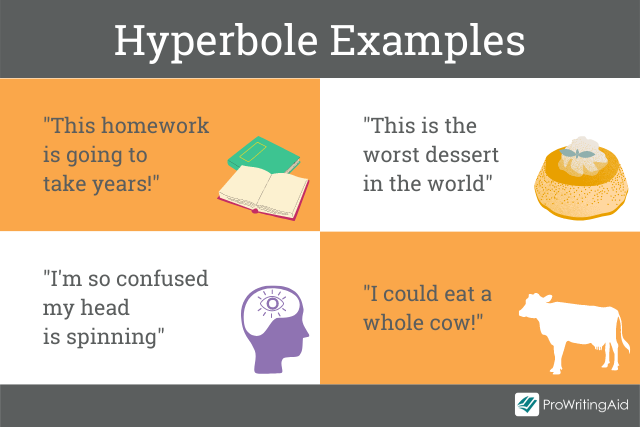
What Are Some Hyperbole Examples in Movies, Literature, and Music?
Writers know hyperbole is an effective tool, eliciting strong reactions from viewers, readers, and listeners.
Sometimes they generate loud laughs at their over-the-top ridiculousness, other times they give insight into how the writer or a character feels about or perceives something.
For some over-the-top ridiculousness, look no further than John C. Reilly (as Dale Doback) and Will Ferrell (as Brennan Huff) in Stepbrothers.
In this film, the two are pathetic, spoiled 40-somethings still sleeping in twin beds, still eating chicken nuggets, and still depending on their respective single parents to supply their every basic need (and that’s not a hyperbole).
When their parents get married, the two fall into instant childish competition:

Brennan: I have a green belt. Read it and weep.
Dale: I don’t believe in belts. There should be no ranking system for toughness. One time I wrestled a giraffe to the ground with my bare hands.
This hyperbole serves double duty: it makes the audience laugh at the utter stupidity of the claim and the character who thinks anyone would believe that claim, but for the character Dale, it “reveals” his perceived superhuman, manly strength.
Then we have hopeful Jack (Leonardo DiCaprio), arms outstretched at sunset on the still floating Titanic yelling “I’m king of the world!”
Of course he’s not. He’s just a poor young man looking for a new life. But we get the message. With his new love, Rose, he has everything.
When Is Hyperbole Used in Literature?
Shakespeare’s characters are well-known for expressing their emotions through hyperbole. His plays provide tons of examples.
In Act III scene iii of Romeo and Juliet, Romeo is banished from Verona, where his love, Juliet lives. In his emotional torment he cries, “[t]here is no world without Verona walls, / But purgatory, torture, hell itself.”
In Act V scene i of Hamlet, after Laertes expresses (also hyperbolically) his grief over his sister Ophelia’s death, Hamlet says, “I lov’d Ophelia. Forty thousand brothers / Could not (with all their quantity of love) / Make up my sum.”
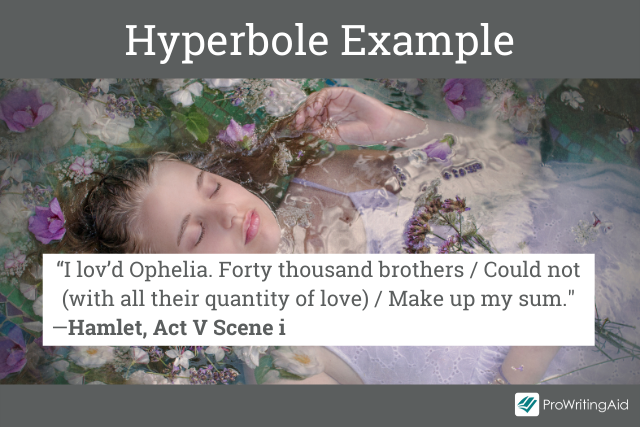
In her memoir I Know Why the Caged Bird Sings, Maya Angelou uses hyperbole to allow her childhood perspective to come through to the reader.
To emphasize the pain she felt as a young child because of an infected tooth, Angelou writes “I prayed earnestly that I’d be allowed to sit under the house and have the building collapse on my left jaw.”
In another instance, when three-year-old Maya is in church and tries to leave the building because she has to urinate desperately, Angelou recounts her feelings this way:
“...I knew I’d have to let it go, or it would probably run right back up to my head and my poor head would burst like a dropped watermelon, and all the brains and spit and tongue and eyes would roll all over the place.”
In literature, hyperbole heightens our understanding of a character’s feelings, actions, or experiences.
What Are Some Examples of Hyperbole in Songs?
Songs often express emotion, so it makes sense that they are a reliable resource for hyperbole.
Take Bruno Mars and “Grenade.” In this song, the speaker/singer is so dedicated that he tells his lover,
I’d catch a grenade for ya
Throw my hand on a blade for ya
I’d jump in front of a train for ya
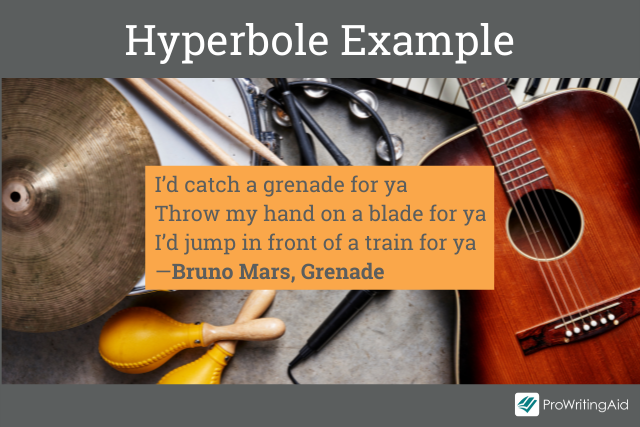
A nice sentiment, but would he really?
Bruno is not alone, not by a long shot. The Beatles reminded us that “All You Need is Love.” Taylor Swift sang “And you’ve got a smile / That can light up this whole town” and Roberta Flack confessed (he was) “killing me softly with his song.”
Read the lyrics of just about any other artist and you’ll find more hyperboles than you’ll find sand on the seashore.
How Is Hyperbole Used in News and Politics?
Hyperbolic headlines and stories sell newspapers and earn clicks.
When Michael Jackson died, Entertainment Weekly reporter Josh Rottenberg wrote that “Jackson’s sudden death brought... the entire world—to a stunned halt.”
Except it didn’t. I know I had to work that day, and there was plenty of traffic, so not everything shut down. But we get his point.
In a clever title that uses both the word and an example of hyperbole, the Wall Street Journal published “Climate Change Brings a Flood of Hyperbole” (Koonin, Steven. 10 August 2021).
A headline from a New York Post article by Karol Markowicz is titled “Vaccine mandates are a cruel stick to beat people with. They will tear us apart.”
What’s clear is Ms. Markowicz disapproval of vaccine mandates; also clear is that those mandates are not actually being used as physical sticks with which to physically beat people.
While the mandates are causing fierce disagreement, but we are not literally being ripped to shreds.
Our world leaders don’t shy away from hyperbole in politics. Many, if not most, political speeches make hyperbolic promises of how their country and world is/will be a better place, closer to perfect, if they are elected.
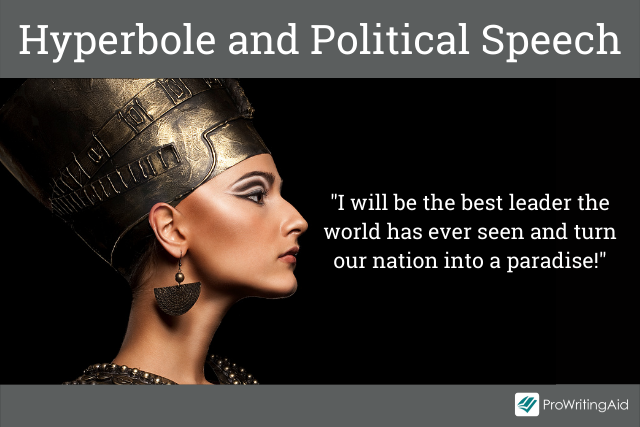
Some even use shameless hyperbole as they express themselves. Prime Minister Johnson and then-President Trump shared these thoughts about their own respective recoveries from COVID-19, as reported in the New York Times.
“I could refute these critics of my athletic abilities in any way they want: arm-wrestle, leg-wrestle, Cumberland wrestle, sprint-off, you name it,” Mr. Johnson said, sounding a bit like Mr. Trump, who despite being 74 and moderately obese attributed his recovery to the fact that he is a “perfect physical specimen.”
Using Hyperbole in Satire
Satirists love hyperbole more than anything—parents, children, spouses, or food. It’s an ideal vehicle for their mocking criticisms of the shortfalls they see in politics, society, and culture.
The debate over gun control has raged with intensity for the last decade or so in the United States.
After a series of school shootings (that continue still), the National Rifle Association proposed the idea of arming students.
In response, columnist Rich Cohen of the Washington Post countered with a satire filled with hyperbole.
“If one gun in the hands of, say, the principal is good, think of what hundreds of guns in the hands of students would do. I mean, who’s gonna take on that school?”
Is Hyperbole and Cliché the Same Thing?
Hyperbole and cliché are not the same. However, some hyperboles have become clichés due to overuse in everyday speech.
For example, if you say “I’m so hungry I could eat a horse!”, you’re using hyperbole and a cliché at the same time.
Clichés can make your writing feel stale. They can also alienate readers who aren’t familiar with them.
ProWritingAid’s Clichés and Redundancies Report will highlight any clichés in your writing so you can use hyperbole without sounding like a broken record (cliché alert!).
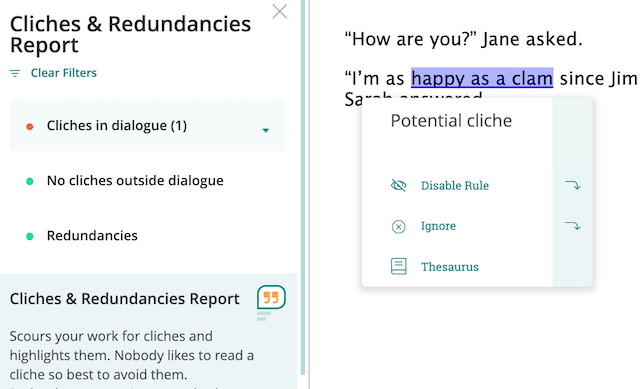
Try the Cliché Report now with a free ProWritingAid account.
Is Using Hyperbole Lying?
There are differing views on hyperbole. As for whether it’s truth or lie, that largely depends on how it’s used.
If hyperbole is not used intentionally in a statement, or the giver intends for the statement to be taken as literally true, the “hyperbole” label can be replaced with “falsehood.”
Other times, even if the giver uses it intentionally, the receiver still believes the statement, literally, which can lead to false beliefs.
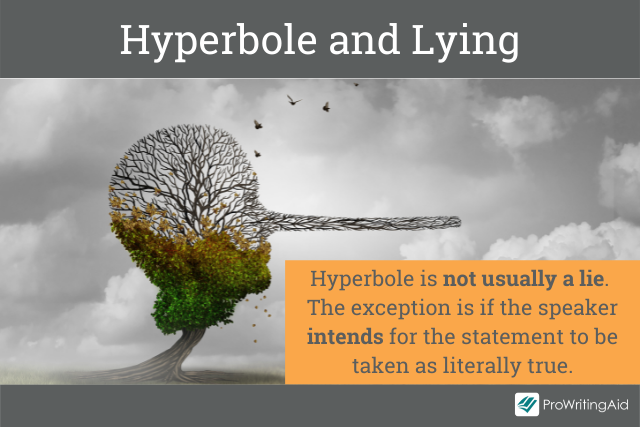
Hyperbole Can Be Complicated
Author Kate DiCamillo said “Hyperbole is sometimes necessary to get at the truth. (It seems odd, doesn’t it, that we have to lie to tell the truth better)?”
Roman philosopher Lucius Seneca expressed his belief that hyperbole “asserts the incredible in order to arrive at the credible” in his letter, (translated) “On Benefits.”
In Rhetoric, Aristotle called hyperbole essentially immature, saying that “hyperboles are for young men to use…” that they show “vehemence of character, and this is why angry people use them more than other people.”
In Damon Linker’s article Our Dangerous Addiction to Political Hyperbole he writes, “And there we see the defining paradox of our time: The more we shout, the less we hear. The more we exaggerate, the less we believe. And the more we hype the truth as we perceive it, the less likely we are to think anyone else has anything valuable to say.”
What do you think about hyperbole? Useful device, or misleading trick? Let us know in the comments.

